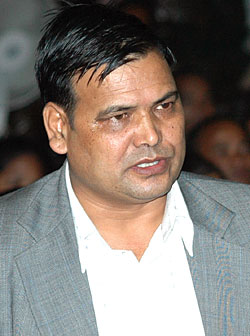 |
Objectivity in news is difficult to determine even in normal times. When shady players are looking for opportunities to manipulate information in a transitional polity, it becomes almost impossible to guard against manufactured realities. The tape scandal involving Maoist strongman Krishna Bahadur Mahara and an unidentifiable interlocutor probably falls in the later category.
The conversation on the controversial tape is perhaps factual. Mahara has not disowned it. The Maoists are more interested in the mechanism, morality and legality of taping private discussions and intimate negotiations. In all probability, Mahara discussed things that he is recorded to have discussed. But with whom?
The identity of the person at the other end of the line is not clear even though his possible motives are. The impersonator wanted to take advantage of Mahara's gullibility and kill two birds with one stone: defame the Chinese and demonise the Maoists. You don't need to be Sherlock Holmes to crack the case. That an India-based television channel first played the tape, is a definitive pointer.
Then, Kantipur daily's editor, Sudheer Sharma, wrote a front-page commentary revealing the way certain diplomatic mission had made attempts to plant the story in the media. He went on to disclose that they had been approached while socialising with the Chinese ambassador. That gave another twist to the whole episode. Apparently, the mainstream media and diplomatic missions in Kathmandu are much closer to each other than we thought.
The Nepali audience seems to be better at detecting deceptive coverage than many journalists realise. Despite persistent approach to blow the tape controversy into a scandal, the news of seemingly incriminating conversation has failed to penetrate the public imagination. The Nepali audience has dismissed the whole affair as one of those things that make politics what it is: a cesspool.
Everything is fair in love, war and politics. Persuasion, bribery, punishment and deception are considered inalienable components of politics. All sides in a multi-cornered contest use these methods to neutralise or overcome their competitors. Which is why the public brushed off the scandal with a shrug.
Last year, the disclosure of the Shaktikhor videotape, in which Pushpa Kamal Dahal was shown claiming credit for misleading parliamentary parties, tricking UNMIN and taking the gullible government for a ride, failed to create widespread indignation. The social elite in Kathmandu cribbed about it for a while and then it was forgotten as soon as Dahal was evicted from Baluwatar. Readers seem to know how to sift through news breaks.
The Mahara-tape affair was clearly a sting operation, but the media can claim no credit for unearthing it. Whenever an interested party releases 'news', it becomes a plant and media stands to lose its credibility. It is possible that revelations so far have been mere pressure tactics to make the Maoists fall in line.
Leaders in the anti-Maoist alliance know very well that the Maoists were nurtured by the country that wants it contained now. They could be next.
That could be the reason the government has refused to take the matter seriously. Political capital is being made out of the scandal on the floor of the legislature, but no judicial investigation has been ordered so far.
It is all right for tabloids and sensational televisions to fall for planted stories. The mainstream media should know better than treating it as news. Free media needs to use its own judgement in separating information from propaganda. A slight slant can sometimes be forgiven, but wholesale adoption of plants will cost the media its credibility.



